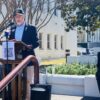|
Getting your Trinity Audio player ready...
|
Facing mounting pressure from government officials from Gov. Kay Ivey to multiple state legislators, Alabama Public Library Service Director Nancy Pack has ended the state agency’s membership in the American Library Association.
“There are differing perspectives regarding Alabama’s relationship with the American Library Association,” Pack wrote in an Oct. 12 administrative memo. “While the Alabama Legislature appears inclined toward disaffiliation, Governor Ivey is recommending that individual governing boards approve expenditures of public funds related to the American Library Association in open meetings.
“In response to these considerations, the Alabama Public Library Service will discontinue our institutional membership to the American Library Association.”
The move has been pushed steadily by the group Clean Up Alabama over the past few months as its main goal at the APLS level. While multiple county GOPs and commissions have signed onto petitions for disaffiliation from the ALA, as Pack noted, Ivey did not ask the APLS to completely disaffiliate from the association.
However, another part of Pack’s memo is ripped straight out of Ivey’s open letter making suggested changes to the APLS.
“The official stance of APLS is that it is entirely permissible to make decisions that lead to a more parent- and child-friendly library environment,” Pack said in the memo, nearly verbatim from Ivey’s letter. “Limiting a child’s access to potentially harmful content or relocating controversial reading materials should not be misconstrued as censorship in any form. APLS recommends that libraries exercise their best judgment when it comes to shelving sexually explicit or otherwise inappropriate materials, regardless of the intended age group, to support a parent’s right to protect their children.”
Challenges against what some Alabama residents consider “inappropriate content”—largely LGBTQ+ affirming books—have largely been rejected so far in communities across the state. But defenders of the books have argued against the idea that moving the books is not censorship since the books would remain in the library.
Alabama Library Association president Matthew Layne told Al.com’s Williesha Morris that Pack’s recommendation is “the very definition of censorship.”
“We as Alabamians should in no way capitulate to a vocal minority of individuals who wish to control what our citizens choose to read for themselves and for their families,” Layne said. “Now is the time for all good citizens to write to their Alabama legislators, their city councilors, and Gov. Ivey to let them know the freedom to read is a right worth defending in Alabama.”
Pack told AL.com that the final decision would be up to the APLS executive board.
District 5 board member, and chair of the Alabama Republican Party, John Wahl has expressed concern on multiple occasions about the ALA, joining in the national Republican chorus of concern about ALA president Emily Drabinski’s statement that she is a “Marxist lesbian.”
The APLS executive board will meet at 10 a.m. on Thursday, Nov. 16. at its office at 6030 Monticello Drive in Montgomery.





















































